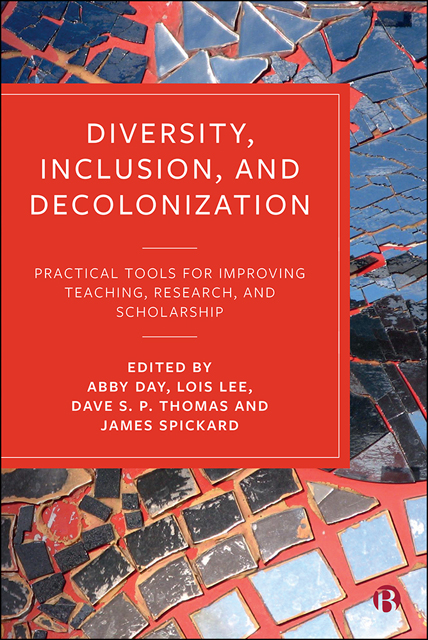 Diversity, Inclusion, and Decolonization
Diversity, Inclusion, and Decolonization Book contents
- Frontmatter
- Contents
- List of Figures and Tables
- Notes on Contributors
- Acknowledgements
- Typographical Note
- Introduction: Why Diversity, Inclusion, and Decolonization Matter
- Part I Changing Universities
- Part II Diversifying Curricula
- Part III Diversifying Research and Scholarship
- Part IV Overcoming Intellectual Colonialism
- Epilogue: What We Have Learned
- Index
13 - Dealing with the Westernisation of Chinese Higher Education: Evidence from a Social Science Department
Published online by Cambridge University Press: 13 October 2022
- Frontmatter
- Contents
- List of Figures and Tables
- Notes on Contributors
- Acknowledgements
- Typographical Note
- Introduction: Why Diversity, Inclusion, and Decolonization Matter
- Part I Changing Universities
- Part II Diversifying Curricula
- Part III Diversifying Research and Scholarship
- Part IV Overcoming Intellectual Colonialism
- Epilogue: What We Have Learned
- Index
Summary
Introduction
The well-known Chinese social scientist Ambrose King Yeo-chi (1978, p 37) wrote that sociology is ‘a Western flower transplanted into Chinese soil’ through the translations of Herbert Spencer’s The Study of Sociology and Franklin Giddings’ Principles of Sociology at the turn of the 20th century. In consolidating their power in East Asian countries, colonial administrators not only imposed unequal commercial treaties; they also spread Western social theory; this act, among others, relegated Asian social sciences to the margins (Alatas, 2000). This coloniality of knowledge (Mignolo, 2007) was even extended to countries that were not subject to formal colonial domination (Alatas and Sinha, 2001). As a consequence, Asian social sciences have not become sources of universally accepted paradigms and of professionally recognised knowledge translated beyond their countries of origin (Clammer, 2000, p 47).
This theoretical weakness has hindered the development of distinct Asian sociological schools and has also prevented the accumulation of knowledge, as the careless application of Western concepts and methods to Asian societies has often produced poor results (Nakane, 1992, p 4). Within China, Western epistemological hegemony has largely evaded challenge. Even though China and several other East Asian countries now play a major role in the global economy and their universities now attract a growing number of Western students and scholars, social science in most Asian nations is still dominated by Western scholarship disseminated by the leading North American and Western European universities (Qi, 2014).
On a world scale, however, debate on the Westernisation of knowledge has begun to generate its own significant scholarship, as have the efforts to decolonise higher education in general (de Oliveira Andreotti et al, 2015). Most contributions to this subject have come from intellectuals from the global South, feminist scholars, black social scientists, and students from indigenous communities (Keskin, 2014). These scholars have raised strong criticisms against the exclusionary curricula of Western universities (Peters, 2015; Bhambra et al, 2018) and have advocated ‘epistemic disobedience’ in order to decolonise knowledge (Mignolo, 2009). Although a few scholars have noted the West’s intellectual hegemony in Asia at large (Wang, 2011; Alatas and Sinha, 2017), the Westernisation of higher education in China and the Eurocentrism of teaching sociology in that country have been the object of little focused debate.
- Type
- Chapter
- Information
- Diversity, Inclusion, and DecolonizationPractical Tools for Improving Teaching, Research, and Scholarship, pp. 205 - 219Publisher: Bristol University PressPrint publication year: 2022


